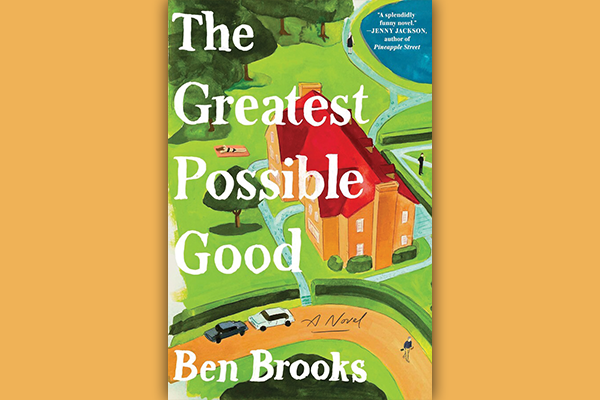WHAT’S THE BEST use of our lives? Should we, as Jesus advises in Matthew 19, sell our possessions and “give the money to the poor” in hopes of a “treasure in heaven”? Or can we interpret this verse in a slightly less extreme way, instead holding up Jesus’ words as a sort of aspirational metaphor?
This question is at the core of The Greatest Possible Good by Ben Brooks.
We meet the Candlewicks, a wealthy but disaffected family of four living in the idyllic Cotswolds in England, surrounded by every luxurious distraction they could desire. Their lives change drastically when the father, Arthur Candlewick, falls into an abandoned mine shaft, sustaining a head injury. While stuck there for three days with his son’s stash of drugs and his daughter’s book on effective altruism, Arthur experiences what he calls his “road to Damascus moment.” The ordeal transforms Arthur, leading him to give away his entire fortune to charity.
Arthur becomes fixated on maximizing his good works, making sure that each penny lands at a charity that will do the greatest good for the greatest number of people.
“It’s either true that we ought to be helping people using all the excess we have,” Arthur tells his wife Yara, “or it’s not true. There’s no in between. There’s no world in which occasionally throwing five pounds into a charity bucket is enough.”
Trying to reject his privilege, Arthur sells his BMW, his investments, and his expensive art collection. He lives a stripped-down, solitary life in a shabby apartment, spending his days eating out of tins, picking up trash, volunteering at non-profits, and encouraging people “to give until they [feel] the strain on their own lives.” Arthur’s decision causes chaos for his family, driving them more deeply into themselves and leading them down strange paths.
Did Arthur make the right decision? The answer might depend on who you ask. “He sounds like a good person,” a character named Leo says. “But he probably does as much good as gap-year students building unusable orphanages in Uganda.”
Throughout the book, Arthur’s actions certainly feel futile at times. As a reader, it’s tempting to start assessing the worthiness of his sacrifices by calculating the amount of good they produced. Regardless, Arthur was satisfied with the trajectory of his life, with his small actions that made small differences.
As the narrator explains, Arthur was happy, “but only because he’d been lucky enough to receive a life-changing head injury that turned him into a kind of shambling angel, someone who ought to be venerated but really was treated with suspicion.”
So, when the novel arrives at the precipice of answering that supreme question—how can we make the greatest use of our lives?—each character has a different answer, and likely each reader too.
During a particularly tender moment, years after the mine shaft incident, Arthur’s adult son Emil is trying to make sense of the way his life turned out. Arthur offers up some wisdom in the face of his son’s uncertainty about place and purpose. According to Arthur, we should simply head in the direction of “something you’ve done that felt like the thing you ought to be doing.”
It’s a convoluted way to say “Follow your heart.” But perhaps that’s all there is to it.

Got something to say about what you're reading? We value your feedback!

